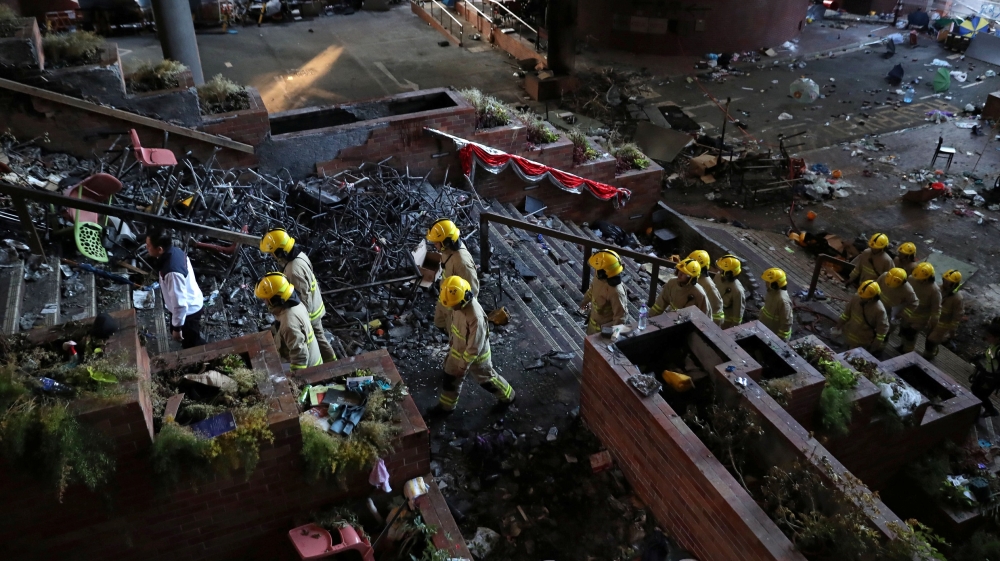Hong Kong police enter Polytechnic University as siege ends
Some 100 personnel, including hazmat teams and explosive disposal experts, fanned out across the vast campus.

Police teams on Thursday ventured inside a Hong Kong university that was at the centre of the most serious confrontations between police and protesters in six months of unrest in the semi-autonomous Chinese city.
The Polytechnic University was besieged by police for more than 10 days as anti-government protesters holed themselves up inside with an armoury of makeshift weapons.
Keep reading
list of 3 itemsAnger after Hong Kong police detain medics providing protest care
Hong Kong pro-democracy movement scores landslide win
Police began clearing the site after the administration completed a two-day search of the campus and said they believed no one else remained inside.
They said they found one young woman, who was in a weak condition, and a stockpile of dangerous items including petrol bombs and corrosive liquid.
Hours before the police operation, a masked protester came out from hiding and told reporters there were less than 20 people still on the campus.
“The remaining protesters never trust the police. It explains why for the past few days when the university management searches for us, we keep hiding,” said the protester, who identified himself as Ah Bong.
He warned they would “definitely protest” if police enter the campus.

Police sealed off the university as protesters retreated into the campus after blocking a significant tunnel and setting toll booths on fire, threatening to arrest anyone who came out.
Some 1,100 protesters are thought to have left.
Police urged to ‘retreat’
A senior police official, Chow Yat-ming, said the focus of the operation was not to arrest anyone but to remove hazardous items that were a threat to public safety, and to gather evidence of “malicious” damage to campus facilities.
If they found any protesters, he said police mediators and counsellors would encourage them to seek medical treatment and would take their details for possible further action.
“Our major concern today is not about arrest, it’s about their well-being,” Chow said. He said it was unclear how long the operation would take.
Meanwhile, pro-democracy opposition leader, Joshua Wong, urged the police to “retreat” from the campus and “set our trapped protesters free”.
|
|
“All we ask for humbly is democracy and freedom. Turn to political resolutions and set up an independent inquiry on police brutality,” he wrote in a social media post.
Some 100 personnel, including hazmat teams and explosive disposal experts, fanned out across the vast campus.
Ben Young, the university vice president, was also at the campus on Thursday. He told reporters that authorities needed to deal with “some dangerous items” including Molotov cocktails and “offensive weapons.”
Television footage showed officers searching buildings and removing bottles and other items.
More than 5,000 people have been detained since the unrest started in June over a China extradition bill seen as an erosion of freedoms promised when the former British colony returned to Chinese control in 1997.
The movement has since expanded into wider demands, including universal suffrage and an independent investigation into police conduct.
The protest movement was given another boost after President Donald Trump signed two bills to support Hong Kong human rights and pro-democracy activists. China immediately warned it would take strong countermeasures.
Hong Kong’s government also denounced the move, adding that it sent the wrong signal to protesters.
The Hong Kong Human Rights and Democracy Act mandates sanctions on Chinese and Hong Kong officials who carry out human rights abuses and requires an annual review of the favourable trade status that Washington grants Hong Kong. Another bill prohibits the export of crowd-control munitions to the Hong Kong police.
Some analysts said it may encourage Britain and other Western nations to follow suit.
“It is a major turning point in the protest movement,” said Willy Lam, a political expert at the Chinese University of Hong Kong.